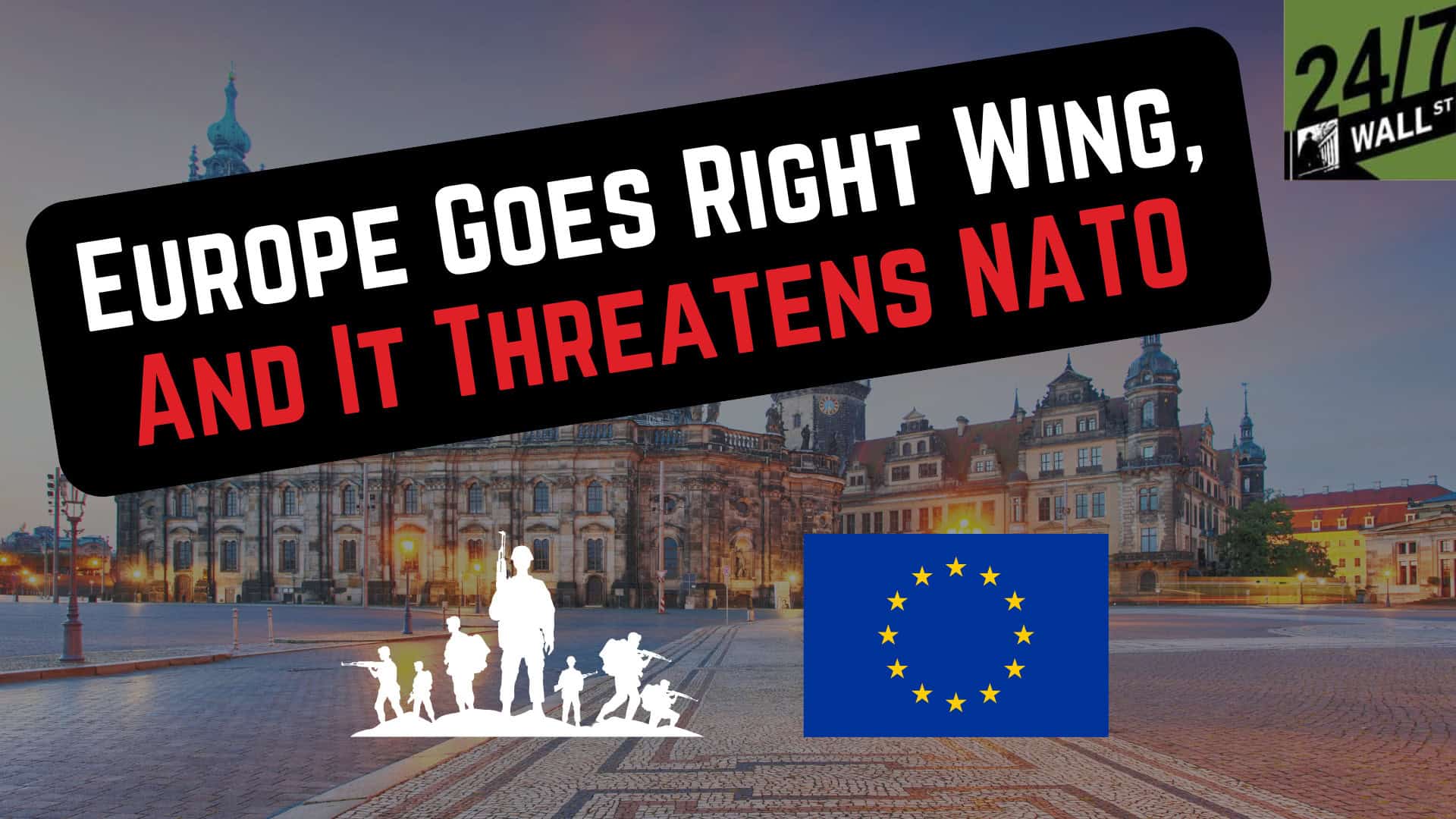
Key Points:
- Populist Shift: Italy, Netherlands, and Germany’s move towards populism complicates Ukraine’s NATO bid.
- Internal Disputes: Tensions between NATO members, like Germany and Poland, create friction.
- Brexit Impact: UK-Spain disputes over Gibraltar add to NATO challenges.
- Also: The smart money is looking past this election and towards what may be the biggest investment opportunity of our lifetime. Learn about “the Next Nvidia” today to see why.
Austin and Michael discuss the internal political shifts in several European countries, which could impact Ukraine’s potential admission into NATO. Countries like Germany, the Netherlands, and Poland are seeing changes in political direction, often towards a populist right-wing stance, which may decrease support for Ukraine. Relations between countries like Germany and Poland are currently strained due to various disputes, including accusations related to the Nord Stream pipeline sabotage. Additionally, the post-Brexit dynamic between the UK and Spain over Gibraltar adds another layer of complexity, given Gibraltar’s economic ties to the EU and resistance to Spanish joint administration. These factors illustrate how the political landscape in Europe is shifting, potentially affecting Ukraine’s future with NATO.
Watch the Video
Edited Video Transcript:
You know, they’re more concerned with what’s going on in their own country.
And it’s hard to continuously send money abroad when you’re going through your own difficulties.
You know, we saw a lot of that kind of rhetoric here in the United States in the last couple of years has been a lot more skepticism.
So, yeah, it’s really up in the air.
You can’t really make any definitive predictions.
Right.
And let’s try and be just at the last moment here.
Let’s try and be a little specific about which countries we have seen make that sort of populist rightward shift.
The European countries matter more maybe than the Western ones like the U.S. at the moment.
So we’ve seen it in Italy.
We’ve seen it in the Netherlands.
Where else?
What other countries are making that populist rightward shift, which might make Ukraine’s admission all the more difficult?
Germany, the Netherlands, both.
We saw it actually go in the other direction with France and the UK.
Poland as well.
That was another aspect, actually.
They were going more towards the kind of pro-NATO, pro-Ukraine, Donald Tusk.
But relations with Germany are kind of strained at the moment.
Again, the accusations that Germany is not doing enough, historical grudges.
There’s also a disagreement about the sabotage of the Nord Stream pipelines.
That’s still quite murky right now, but Germany wanted extradition of a Ukrainian suspect in Poland, which the Poles refused.
And there are accusations that Poland was somehow culpable.
There’s just a lot of bad blood going on.
Yeah, there’s a lot of bad blood between Germany and Poland.
That seems quite unfortunate because it looked like when Tusk got in that that was going to change direction because the previous government were pretty anti-Germany, for lack of a better word.
So, again, that’s up in the air, too.
Yeah, it’s hard to imagine things going well for Ukraine when so many countries are shifting towards a narrative that is internally focused on their own nation and their own politics and some of the challenges that every country is facing right now with their own financial situation or demands from their population.
Very easy to see support for Ukraine waning as countries choose to focus more internally on their own population and their voting, right?
They’re voting at the ballots, but that’s what they prefer at this moment.
Yeah.
Yeah.
Well, it’s a hard case to make when there doesn’t seem to be a definitive outcome.
I think that’s something that’s a difficult sell to make to a population.
But I think if we were talking about other internal disputes, another major one that I think is worth pointing out is post-Brexit UK.
I know that’s not specifically NATO, but that does have a huge bearing because most European members of NATO are also members of the EU.
And there’s a lot of complications involved with how Britain does business with the rest of the continent.
One of the big issues right now, which is actually being worked through is Britain and Spain over Gibraltar.
Now, Gibraltar is a really interesting case because it’s been an overseas British territory since 1713, and Spain are obviously quite aggrieved by that.
In fact, a little… A little fact I always like to bring out is the largest battle of the American Revolutionary War didn’t take place in the United States.
That took place in Gibraltar.
65,000 Spanish and French troops tried to take it back unsuccessfully.
But anyway, the point is Gibraltar has been a bone of contention between Spain and Britain for hundreds of years.
And then since Brexit, there’s a real divide in Gibraltar because the vast majority of Gibraltar people, Gibraltar voted to stay in the EU.
Ninety-six percent overwhelming because that’s almost their entire economy is focused on that.
But they overwhelmingly do not want to become part of Spain.
Spain has, excuse me, Spain proposed a kind of joint administration, which the people overwhelmingly rejected.
So that’s something they’re going to have to work through.
I don’t want to overstate that as a huge issue between the two countries, but it’s just a complicating factor on top of many complicating factors that we’re seeing at the moment.
We spoke…
Take Charge of Your Retirement In Just A Few Minutes (Sponsor)
Retirement planning doesn’t have to feel overwhelming. The key is finding expert guidance—and SmartAsset’s simple quiz makes it easier than ever for you to connect with a vetted financial advisor.
Here’s how it works:
- Answer a Few Simple Questions. Tell us a bit about your goals and preferences—it only takes a few minutes!
- Get Matched with Vetted Advisors Our smart tool matches you with up to three pre-screened, vetted advisors who serve your area and are held to a fiduciary standard to act in your best interests. Click here to begin
- Choose Your Fit Review their profiles, schedule an introductory call (or meet in person), and select the advisor who feel is right for you.
Why wait? Start building the retirement you’ve always dreamed of. Click here to get started today!
Thank you for reading! Have some feedback for us?
Contact the 24/7 Wall St. editorial team.




